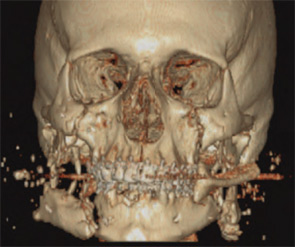Beyond the handful of long-established and well-integrated sites being labeled as de facto accountable care organizations (ACOs), advocates are seizing the moment and pushing for a bold vision of what role ACOs will play in the movement to reform the health care payment system across the country.

Unintended Consequences: Combat-related injuries lead to advances in facial plastic and reconstructive surgery
Ever since the first fully equipped otolaryngology team was sent to the Air Force Theater Hospital (AFTH) in Balad, Iraq in 2004, an otolaryngologist-head and neck surgeon has become a permanent member of any deployed multispecialty head and neck team, working alongside a neurosurgeon, ophthalmologist and oral and maxillofacial surgeon.

Evaluating Dysphagia: Maximize exam and swallow studies for diagnostic success
Stroke, muscular dystrophy, Parkinson’s disease, gastroesophageal reflux disease (GERD), head and neck cancer, Zenker’s diverticulum—each of these disparate conditions can cause dysphagia.
Submandibular Gland Excision Successful for Surgical Management of Sialorrhea
What is the best procedure for surgical management of drooling? Background: Surgical treatment for sialorrhea is considered when conservative measures fail. Options include sublingual gland excision, submandibular gland (SMG) duct […]
Propranolol Effective, Well-Tolerated for Symptomatic IH
Will propranolol become the mainstay of treatment for symptomatic infantile hemangiomas (IH)? Background: IH are the most common tumor of infancy, affecting four to 10 percent of infants. Spontaneous involution […]
Language Performance in Disabled Children with Cochlear Implants
What are the effects of cochlear implants (CIs) on language among children with disabilities? Background: Early implantation of a CI in children with typical development is strongly associated with improved […]
Avastin Treatment for Hereditary Hemorrhagic Telangiectasia Epistaxis
Can the vascular endothelial growth factor (VEGF) inhibitor bevacizumab (Avastin) treat hereditary hemorrhagic telangiectasia (HHT) epistaxis? Background: HHT is an autosomal dominant disorder involving abnormal blood vessel development. An estimated […]
The Impact of Thyroidectomy on Vocal Quality Characteristics
With no laryngeal nerve injury, do vocal characteristics change after thyroidectomy? Background: Vocal dysfunction is a feared complication of thyroidectomy. While operative injury to the recurrent laryngeal nerve is a […]

Toward Better Outcomes: Avoid revision surgeries in chronic rhinosinusitis patients
For many patients with chronic rhinosinusitis, functional endoscopic sinus surgery (FESS) has provided much needed relief from a condition that, by its daily aggravation, can significantly reduce quality of life.

HIPAA Expansion: Ensure your practice meets the law’s new provisions
On Feb. 17, 2009, President Obama signed into law the American Recovery and Reinvestment Act of 2009 (commonly referred to as ARRA or the Stimulus Bill) which includes the Health Information Technology for Economic and Clinical Health (HITECH) Act. The HITECH Act includes significant changes to the Health Insurance Portability and Accountability Act of 1996 (HIPAA) that affect otolaryngologists and other health care providers, as well as those who process or work with health care information. Below is a summary of how these new provisions, many of which go into effect this Feb. 17, will affect your practice.
- « Previous Page
- 1
- …
- 282
- 283
- 284
- 285
- 286
- …
- 328
- Next Page »